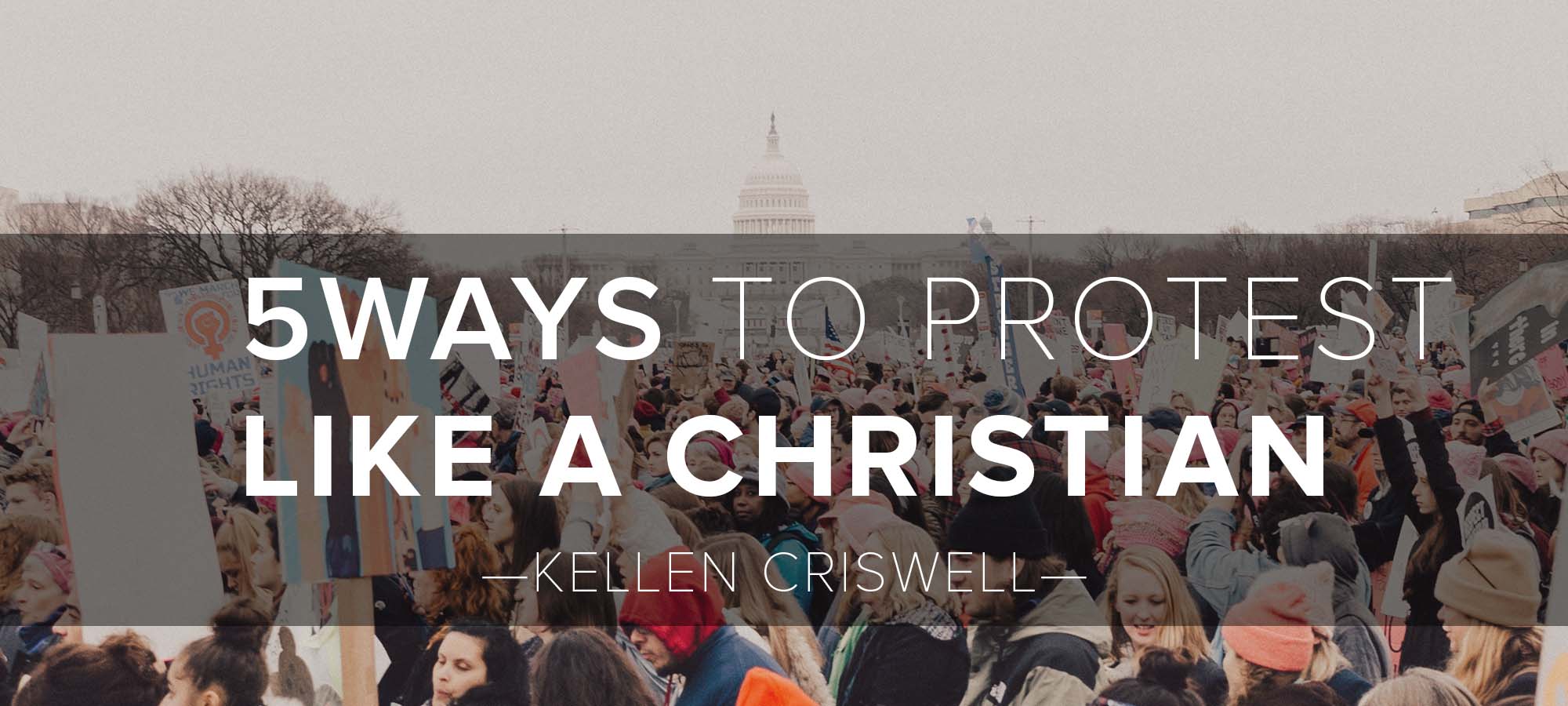
The day of “boycott everything” has officially arrived, and America is in protest frenzy. “You stand for a political party I do not like, so you cannot eat at my restaurant.” “If I did not vote for you, you are #notmypresident.” “If you refuse to make my wedding cake for personal and religious reasons, you are a bigot, and I will be suing you in court.” “If you do not refer to me by the gender identity of my desire, we cannot engage in civilized dialogue.” “If you do not share my views on how to handle the world refugee crisis, you are a racist idiot.” “In the latest rendition of Beauty and the Beast there is an intentionally ‘gay scene’ so I will be boycotting it.” Boycott! Boycott! Boycott! This is our cry as Americans. I have seen examples of each of these statements expressed on social media within a week of the writing of this article.
Christians Protest Too!
Western evangelicals are no exception to the protest-oriented attitude of our day. For some examples that caught my eye in recent history:
• In 2016, Franklin Graham called for a boycott of Girl Scout cookies over issues related to transgender and homosexuality, while aligning himself with a Catholic Priest to do so.
• Russell Moore received a bit of a smack on the wrist from influential leaders in the Southern Baptist Convention for voicing concern about a potential Donald Trump presidency that has now become reality.
• Evangelicals have set social media platforms aflame with heated, often vitriolic debate about everything from gay marriage to the world refugee crisis, and differing values over what makes a legitimate candidate for political office.
• In many cases, Christians have joined fellow citizens in taking to the streets with picket signs and shouts to publicly demonstrate their opinion on social and political issues.
So I ask, should Christians engage in public protest centered on political and social issues, digitally or otherwise? I would offer a hesitant response of yes, but my reasons, and what I see as Biblical methods of protest, may surprise you. Please read on. Here are at least five ways I think Christians may engage in protest:
1. Protest by Prayer.
The greatest method of protest we can engage in is to petition the throne of heaven in prayer. If there is a clear biblical exhortation to believers about how they can make a difference in their community, it is the call to pray for human leaders found in 1 Timothy 2:1-7.
For a discussion of the need to pray for our human rulers, and the way God uses our prayers to shape our social environment, please read “What Every Christian Should do for Donald Trump Today“
For the purposes of this article, suffice it to say that if we have not prayed to God about the social or political situation that has us so upset, we should not be posting angry tweets about it. If we have not prayed about it, we should not be picketing about it. If we have not prayed about it, we should probably not even complain about it.
Prayer is a means God has given to His people by which they may work to see biblically defined righteousness molded into the fabric of society. By prayer Jesus sees fit to establish the norms and mores of His kingdom in the midst of the communities of earth (Matthew 6:10). By prayer, God influences the hearts and minds of human rulers to rule according to His ways, that His people might freely live like Jesus, and share His gospel openly. Prayer is the truest, most effective form of protest in which Jesus’ people must engage. It is biblically prescribed. If we want our society to be characterized by rulers, laws and lives that reflect the righteousness of God, we have to start with intentional, fervent, petitioning prayer.
2. Protest by Personal Example.
To protest by personal example is simply to cultivate the character of Jesus in how we live, in every sphere of life. By this I do not mean that we should picket on the street because Jesus did. No, I mean that the essence of Jesus’ message and way of interacting with people and society was countercultural in itself. Jesus lived out the “other culture-ness” of the kingdom of God within the sphere of the kingdoms men. His constitution was the Sermon on the Mount, and His life’s ambition was to live out the gospel-acts that the Christian church now proclaims in what we know as the gospel message.
To live like Jesus, loving people in word and deed, preaching the gospel, living the gospel, to be in the world but not of it, this IS a life of protest (John 17:14-18). This kind of life always stands in glaring contrast to the spirit of the age, and the sin-tainted values of humans that govern any society. To protest at this level is nothing more than pursuing personal discipleship, being transformed into the image of Christ, from glory to glory. The disciple-life is inherently revolutionary, because it is about imitating a countercultural Savior and living out a faith that is inherently otherworldly.
3. Protest by Participation.
This is where we get down to more obvious forms of protest. By participation, I mean Christians have a biblically defined freedom to raise a voice of protest according to their particular government’s provision. In America, Christians should vote. Christians should run for political office and promote God-defined righteousness in legislation. However, what about participating in formal public protests? The Bible is clear that Christians are to be, “subject to the governing authorities.” (Romans 13:1) Does this rule out voicing disapproval of our leaders’ decisions in public protest?
I say no. The reason is not because the Bible tells me I MUST engage in formal public protest, but because it allows me to do so. If my government has declared the people to have a right to peaceably assemble in protest, I can obey the biblical command to submit to my government, while voicing my disapproval with the decisions and actions of my government leaders at the same time. So, I say believers are biblically permitted to engage in public protests, digitally and as part of a formal public demonstration. Yet, I say permitted and not commanded because I do not believe the case can be made that Christians must participate in public formal protests on the basis of Christian duty or the teaching of Scripture.
4. Protest by Propriety.
If Christians want to join the ranks of public demonstrators (digitally or on the street), they should do so in a way that provides a clear distinction between them and people who do not know Jesus. What troubled me during the 2016 Presidential elections is not the fact that we Christians disagreed with Trump, Hilary, or each other, but how we expressed our disagreement. Virtually every day I would peruse social media and end up reading tweets, Facebook posts and articles by committed Christian friends, voicing their opinion about the candidates with passion and eloquence. What was often lacking was an attitude of humility, hospitality or respect. What were too often included were attitudes of pride, older-brother-ism (see Luke 15:11-32), disrespect, character assassinations and an unwillingness to honestly listen to those with opposing views.
James, the brother of Jesus, wrote some challenging words to you and me about that are relevant to this discussion: “…My beloved brothers: let every person be quick to hear, slow to speak, slow to anger” (James 1:19).
“…No human being can tame the tongue. It is a restless evil, full of deadly poison. With it we bless our Lord and Father, and with it we curse people who are made in the likeness of God. From the same mouth come blessing and cursing. My brothers, these things ought not to be so” (James 3:8-10).
What is the point?
It is one thing to be a Christian and publicly voice our concern or disapproval of government leaders and policies. The attitude in which we voice our concern is another issue altogether, and an equally important one at that. If we feel compelled to protest because of legitimate social and political concerns, we must make sure we do so with a Christ-like attitude, words, tone and demeanor. Jesus equally loved religious leaders like Nicodemus, terrorists like Simon the Zealot, crooks like Matthew the tax collector, and murderous persecutors of the faith, like Paul the Apostle. Certainly then, he equally loves Refugees and those insensitive to their plight, homosexuals and marriage traditionalists, democrats and republicans, womanizers and feminists, and Christians who disagree with one-another.
Is the heart that drove Jesus to die for your personal sin and shame reflected in the emotion you show, words you say, and the values that mold your approach to public discourse and protest?
Again, in Romans 13:1, Christians are commanded to, “be subject to the governing authorities.” In verse two, we are warned that, “…Whoever resists the authorities resists what God has appointed, and those who resist will incur judgment.” If the command to be “subject” and the warning to not “resist” mean anything, they mean that Christians who participate in public protest and disagreement must do so with humility toward every person made in the image of God (which includes all humans).
5. Protest by Priority.
Here is where the firm line is drawn. If government leaders ever demand that Christians recant our faith, or commit acts of biblically defined sin, we must be willing to resist unto death. As Peter replied to those who would silence his gospel preaching, “We must obey God rather than men.” (Acts 5:29) When it comes to human authority trying to force us to deny Jesus or pervert the gospel, Christians must resist. However, a believer does not resist through armed revolution, but by spiritual resolve, enabled by the Holy Spirit. This is the witness of the martyrs, from the first martyr, Stephen, (Acts 7) to the present day victims of ISIS.
What Forms Your View of Christian Protest?
What forms your view of Christian protest? As believers, Scripture should shape every area of our lives. Some live in a bit of a dichotomy where they think they have a set of Christian duties that are defined by the Bible, and then a separate set of social and political duties that are defined by being an American. I personally believe my identity as a Christian supersedes my earthly nationality, and shapes what I will and will not do as an American. It is the Bible that must drive my engagement with the politics and societal issues of the country in which I live. This includes how I approach whether I will protest, how I will protest, and why.
But what do you think? Whatever view of Christian protest you adopt, I encourage you to prayerfully read the broad witness of Scripture on this topic. Find the view that you believe makes the best sense out of the most passages. Here are some good texts to start with:
“Know this, my beloved brothers: let every person be quick to hear, slow to speak, slow to anger” (James 1:19).
“…But no human being can tame the tongue. It is a restless evil, full of deadly poison. With it we bless our Lord and Father, and with it we curse people who are made in the likeness of God. From the same mouth come blessing and cursing. My brothers, these things ought not to be so” (James 3:8-10).
“Repay no one evil for evil, but give thought to do what is honorable in the sight of all” (Romans 12:17).
“Honor everyone. Love the brotherhood. Fear God. Honor the emperor” (1 Peter 2:7).
“So then, as we have opportunity, let us do good to everyone, and especially to those who are of the household of faith” (Galatians 6:10).
“I say this to your shame. Can it be that there is no one among you wise enough to settle a dispute between the brothers, but brother goes to law against brother, and that before unbelievers? To have lawsuits at all with one another is already a defeat for you. Why not rather suffer wrong? Why not rather be defrauded? But you yourselves wrong and defraud—even your own brothers!” (1 Corinthians 6:5-8).
“Let every person be subject to the governing authorities. For there is no authority except from God, and those that exist have been instituted by God. Therefore whoever resists the authorities resists what God has appointed, and those who resist will incur judgment. For rulers are not a terror to good conduct, but to bad. Would you have no fear of the one who is in authority? Then do what is good, and you will receive his approval, for he is God’s servant for your good. But if you do wrong, be afraid, for he does not bear the sword in vain. For he is the servant of God, an avenger who carries out God’s wrath on the wrongdoer. Therefore one must be in subjection, not only to avoid God’s wrath but also for the sake of conscience. For because of this you also pay taxes, for the authorities are ministers of God, attending to this very thing. Pay to all what is owed to them: taxes to whom taxes are owed, revenue to whom revenue is owed, respect to whom respect is owed, honor to whom honor is owed” (Romans 13:1-7).









